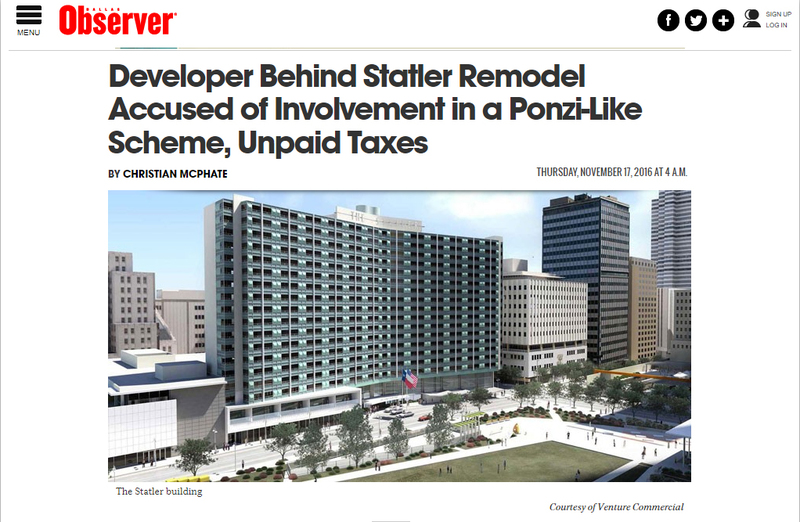Developer Behind Statler Remodel Accused of Involvement in a Ponzi-Like Scheme, Unpaid Taxes
Dallas developer Mehrdad Moayedi has spent the last two years juggling several projects across Denton, Dallas and Collin counties. As the president and CEO of Centurion American Development Group, he has mastered the use of special purpose districts to help fund development in rural areas, birthed a Riverwalk town center in Flower Mound that looks nothing like the original proposal voters approved, and tackled the difficult task of remodeling the historic Statler Hotel, a downtown Dallas building that was nearly demolished in 2003.
A native of Iran who came to America in the late '70s, Moayedi was profiled in D CEO magazine in November 2015 and heralded as someone Dallas needed to know “because he has taken a small construction and development firm and grown it into a diversified real estate powerhouse.” His company planned to invest $175 million in redevelopment of the Statler to create 161 hotel rooms, 219 residences, meeting spaces, retail and office spaces, four restaurants, a lounge and a 14,500-square-foot ballroom.
“It’s got a lot of history,” Moayedi told the magazine, speaking about the Statler. “I think we’re being very conscious of preserving it. This hotel put Dallas on the map before. We’re just going to try to preserve the history and pass it on.” He hinted at a grandiose unveiling in October.
The unveiling hasn't happened yet. Instead Moayedi finds himself battling a class-action lawsuit, a citation for failure to pay school taxes and attacks from Kyle Bass, a Dallas-based hedge fund operator who claims Moayedi is part of a Ponzi-like scheme involving United Development Funding IV, a Dallas-based real-estate lender.
Centurion American didn't respond to a request for an interview.
The failure to pay school tax citation was filed in early September by the Frisco Independent School District. The school district claims FH 295, LLC, who's registered agent is Moayedi, owes more than $200,000 in unpaid school taxes on three tracts of land located in Frisco Hills, a 300-acre master-planned community in Denton County.
Frisco ISD asked the court on Sept. 9 to "order a sale and/or writ of execution shall be issued to the sheriff or constable, directing him to seize and sell each tract as under execution and in satisfaction of this judgment."
Frisco ISD's request comes at a time when Moayedi has been listed as one of the defendants in a March 8 class action lawsuit filed in U.S. District Court. Mark Hay and other investors claim Moayedi, his company Centurion American, United Development Funding IV and several others purchased or otherwise acquired non-listed shares of UDF IV and misrepresented and omitted material which allowed United Development “to raise more than $640 million from those [investors] who purchased UDF IV shares.”
Hayman Capital Management, a hedge-fund sponsor owned by Bass, claimed in its October 2016 report “United Development Funding IV: Stated Financial Position vs. Reality” that FH 295, LLC, is one of Centurion American’s affiliates that received an “unsecured” loan from UDF IV as of Sept. 30, 2015.
Centurion American is one of United Development's largest borrowers, according to Hayman Capital, which claims Centurion American accounts for 43 percent of UDF III loans, 67 percent of UDF IV loans and 62 percent of UDF V loans, “accounting for approximately $615 million of debt in total owed to UDF’s public affiliates with approximately $585 million concentrated in UDF II and UDF IV.”
According to Hayman Capital, United Development would create a funding mechanism called UDF III and invite investors to invest and loan the money to Moayedi to develop property. Then they'd create another funding mechanism called UDF IV, invite investors to invest and loan the money to Moayedi who would then use some of the money to pay off a loan from UDF III.
"It would be one thing to raise money for a fund that focuses on residential in North Texas and another fund that focuses on the Southeast," a Hayman Capital spokesman told the Observer. "But why do you have five different entities [UDFs] to loan to the same developer [Moayedi] in the same area [North Texas]?"
Developer Behind Statler Remodel Accused of Involvement in a Ponzi-Like Scheme, Unpaid Taxes.
Hayman Capital also claims that United Development Funding has some conflict of interests with its largest borrower, Centurion American, despite its claims otherwise:
“The Reality is: The CEO of UDF and the CEO of UDF’s largest borrower, Centurion American own or recently owned a private jet together; Centurion American and a private UDF affiliate co-own a Dallas high-rise condo building; Centurion American and a private subsidiary of UDF I shared a 50/50 partnership to purchase and sell residential lots near Austin, Texas; UDF IV over-lent to Centurion American, which redirected the excess funds to UDF I without any apparent economic reason to do so; None of this is disclosed to the public shareholders of UDF III, UDF IV and UDF V.”
Bass wrote in a letter published on UDFexposed.com that his company's research showed that United Development "exhibited characteristics consistent with a Ponzi scheme, the size and scope of which exceeded billions of dollars."
UDF is using new investor money to pay existing investors. When UDF’s first fund faltered, UDF used money from a second entity – a public affiliate, registered with the SEC – to bail out the first fund. UDF management has been trying to cover its tracks ever since, by perpetuating a Ponzi-like real estate scheme across multiple funds.
UDF management is misleading investors. UDF management has been distorting its poor track record and the financial condition of its public SEC-registered affiliates dating back to the financial crisis.
UDF management is preying on “Mom and Pop” retail investors, using the complexity of real-estate backed loans and a UDF-controlled web of related entities to obscure the fact that UDF is using new investors’ money to make payments to existing investors, and thereby perpetuating the scheme.
"After years of mismanagement, the UDF structure has begun to implode," Bass continued. "Evidence of UDF's dire situation includes a series of defaults, bankruptcy petitions, lawsuits, key resignations — including that of UDF's audit firm, a key UDF director and the CFO of UDF's largest borrower (Centurion American) — followed by UDF's own overdue admission that it has been the subject of a SEC investigation since April 2014.
"... Research ... exposes how a Texas real estate developer built a billion dollar house of cards and why it is now on the verge of collapse," he added.
The Securities and Exchange Commission defines a Ponzi scheme as an investment fraud involving payment of returns to existing investors from funds contributed by new investors. “In many Ponzi schemes, the fraudsters focus on attracting new money to make promised payments to earlier stage investors to create the false appearance that investors are profiting from a legitimate business,” the SEC writes on its website.
SEC investigators made a preliminary determination on Oct. 13 that it may recommend to the SEC that a civil enforcement action or an administrative proceeding be brought against United Development Funding IV. Then a few days later, the SEC suspended trading of United Development Funding IV shares on the Nasdaq Stock Market.
Bass claims he took "a short position" in United Development Funding IV in 2015, which some could argue is why he's researching the real-estate lending company to increase his profit. But Hay and other investors also made a similar Ponzi-scheme claim in their March 8 lawsuit.
They argue that United Development and Moayedi used capital raised in new offerings to pay investors in earlier offerings. “UDF IV maintained the illusion that it and its affiliates were healthy enough to sustain regular distribution payments which, in turn, allowed them to raise additional capital,” according to the March 8 lawsuit.
A couple of weeks before the lawsuit was filed in March, the FBI raided the headquarters of United Development Funding in Grapevine. Thomas Class, special agent in charge of the Dallas field office, wouldn’t tell local news outlets why FBI agents were raiding UDF’s headquarters. He simply said they were “conducting law enforcement activity.”
Attorneys representing both parties in U.S. District Court lawsuit spent 120 days in mediation, but they were unable to come to an agreement. James Booker, an attorney whose Cleveland-based firm Peiffer Rosca Wolf Abdullah Carr & Kane is representing Hays and other investors, claims his clients are seeking to recover losses on an individual basis in securities arbitration against the broker-dealer firms who sold them the UDF investments.
Booker says they amended the original complaint to include a second investor, Paul Brown, who also invested in the United Development funds. He also says his firm has been in contact with more than 100 investors related to this case and plan to seek a jury trial.
The mediation period in the case against Moayedi and United Development ended Wednesday but it appears no resolution was reached.
No court date has been scheduled yet.
Mentions
States
- Texas
Videos





Subscribe for News
Site Digest
Join Professionals on EB5Projects.com →
Securities Disclaimer
This website is for informational purposes only and does not constitute an offer or solicitation to sell shares or securities. Any such offer or solicitation will be made only by means of an investment's confidential Offering Memorandum and in accordance with the terms of all applicable securities and other laws. This website does not constitute or form part of, and should not be construed as, any offer for sale or subscription of, or any invitation to offer to buy or subscribe for, any securities, nor should it or any part of it form the basis of, or be relied on in any connection with, any contract or commitment whatsoever. EB5Projects.com LLC and its affiliates expressly disclaim any and all responsibility for any direct or consequential loss or damage of any kind whatsoever arising directly or indirectly from: (i) reliance on any information contained in the website, (ii) any error, omission or inaccuracy in any such information or (iii) any action resulting therefrom.




